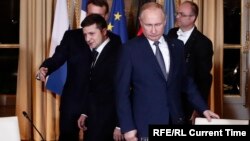For the first time in three years, the leaders of Ukraine and Russia met on December 9 in Paris to discuss the options, if any, for an end to the five-year conflict over territorial control of eastern Ukraine. But Ukrainian and Russian observers interviewed by Current Time see no chance for a landmark breakthrough.
Such a scenario is “practically impossible,” commented Andrei Kolesnikov, a senior fellow at the Carnegie Moscow Center, because “each country has a line that they won’t cross.”
At the talks, held jointly with France and Germany under the so-called Normandy format, Kyiv is expected to demand a final exchange of all prisoners held by all sides, including Ukrainians detained in separatist-controlled Donbas.
Current Time's live coverage of the Paris summit. In Russian only.
President Zelenskiy also announced that he will demand a complete ceasefire in Donbas and control over the entire Ukrainian-Russian border before, in keeping with an earlier proposed peace framework, any local elections are held in Donbas. Kyiv does not control around 400 kilometers of the border.
In turn, Kremlin sources on December 9 stated that Russia intends to take a “hard line” at the talks. Russia, which denies any direct role in the conflict, is expected to demand elections in areas of the Donetsk and Luhansk regions controlled by pro-Moscow separatists, and a special status for these territories. Earlier, President Zelenskiy stated that autonomy will not be granted to the two regions.
Domestic opposition to Zelenskiy’s meeting with Putin and Donbas policy has been growing in Ukraine, however. A protest of several thousand took place outside the presidential administration building in Kyiv on December 8.
At the gathering, former Ukrainian President Petro Poroshenko, whose 2014-2019 presidency started with the outbreak of separatism in Donbas, warned President Zelenskiy against meeting with or trusting Putin.
Russia’s state-run RT outlet on December 8 emphasized that discord, placing in all caps a prediction by one TV news personality, Vitaly Gaudukevich, that Zelenskiy will be “toppled.”
No analyst interviewed by Current Time echoed that prediction, but Kolesnikov noted that Zelenskiy, who came to office with a pledge to end the war in Donbas, does face a “much more complicated” situation than Putin at today’s meeting.
The Kyiv protests against his talks with Putin and political opposition to his Donbas policy mean “they’re looking at each of his steps under a microscope” within Ukraine.
“He can’t be seen to make concessions to Putin …” but, at the same time, Putin’s “rather hardline, non-compromising position” makes a real peace deal unlikely, he added.
By contrast, the talks are a “win-win” scenario for Putin, who faces no domestic pressure over their outcome, Kolesnikov said.
Porosheno’s foreign minister, Pavlo Klimkin, agreed that the risks for Zelenskiy in Paris are “very high.” But he said that he understands President Zelenskiy’s attempt to see “if there’s some chance for a compromise.”
Like other observers, though, he saw no chance for any such compromise.
The December 9 summit became possible thanks to a series of recent changes in Russian-Ukraine relations. In September, Russia and Ukraine exchanged prisoners, and in November Moscow returned three Ukrainian naval ships it seized in 2018 in the Kerch Strait. The countries also agreed about the withdrawal of troops from three areas along the Donbas frontline.
But Klimkin did not mention these developments as grounds for potential optimism.
“I think that the president of Russia will consistently try to use either the problem of Donbas or the complex of gas problems [with Russia] to divide Ukraine and to use Donbas as his sort of Trojan horse,” he said.
A 10-year transit agreement for shipments of Russian gas via Ukraine to western Europe and Turkey will expire on December 31. In late October, Kyiv rejected a Moscow proposal that the two sides drop all lawsuits over the deal and either extend their existing agreement or sign a one-year contract.
The gas question, noted political analyst Taras Berezovyets, “is the biggest intrigue” at the Paris talks between Zelenskiy and Putin.
Some Ukrainians believe Moscow will try to use its gas offer as a condition for meeting Ukraine’s demands on Donbas. Klmkin strongly advised against entertaining any such move: “That will work out only according to the Russian line,” he predicted.
Some have questioned whether the relatively inexperienced Zelenskiy can manage such diplomatic jousting with Putin, but Kolesnkov believes that the Ukrainian leader’s inexperience in power summits and personable manners could play to his advantage.
“He’s a rather courteous conversationalist, judging by the conversation with Trump,” he said, referring to Zelenskiy’s face-to-face August meeting with the U.S. president in New York City. “ He can find some human aspect of the conversation as a way, in theory, to talk with Putin … “
That means, he concluded, that both men are evenly matched – at least psychologically.
Editor's Note: This article earlier stated that Kyiv controls around 400 kilometers of the Ukrainian-Russian border. This was a copy-editing error. In reality, Kyiv does not control around 400 kilometers of the border.





Facebook Forum